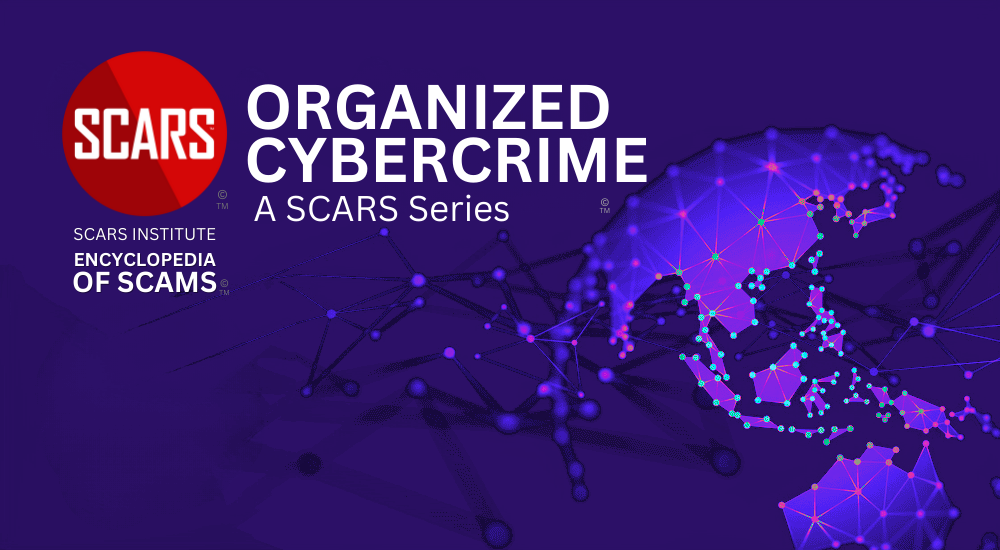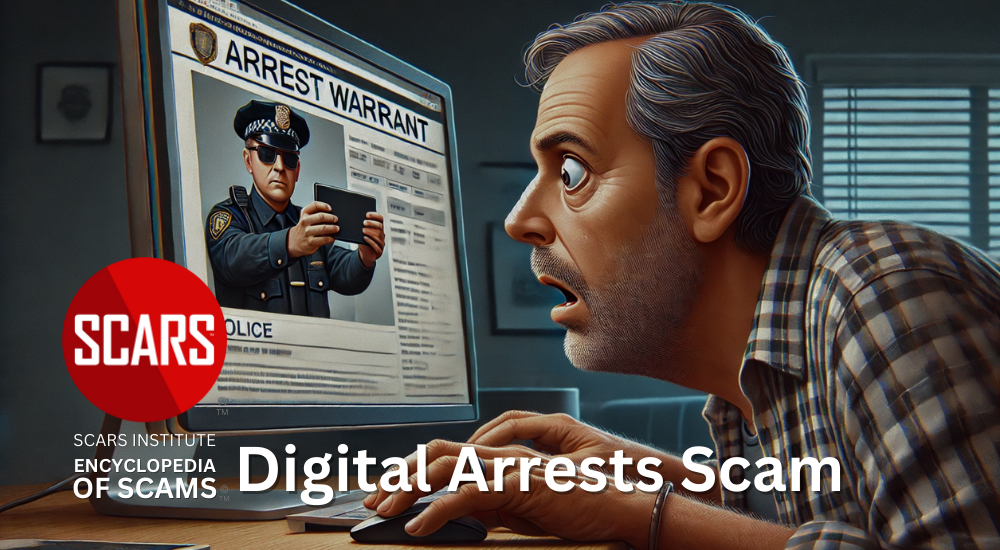
SCARS Institute’s Encyclopedia of Scams™ Published Continuously for 25 Years

Digital Arrests – A Government Impersonation Scam So Crazy It Actually Works
Digital Arrests – Convincing Victims They Have Been Arrested by Zoom Call Using Deep Fakes
How Scams Work – A SCARS Institute Insight
Author:
• SCARS Institute Encyclopedia of Scams Editorial Team – Society of Citizens Against Relationship Scams Inc.
Article Abstract
The digital arrest scam is a sophisticated cybercrime tactic where criminals use manipulation techniques backed up by deepfake technology and fake legal documents to convince victims they’ve been arrested or are under investigation. These scams typically begin with a phone call, email, or message from individuals posing as law enforcement officials or legal representatives, informing victims of alleged criminal activity.
To strengthen their claims, scammers use deepfake videos, audio clips, or forged documents that appear authentic. Victims are then coerced into transferring money or providing personal information under the threat of further legal consequences.
These scams are spreading globally due to the availability of AI and deepfake tools, making it difficult to detect fraud. The rise of these scams underscores the need for awareness, caution, and verifying legal claims to protect against increasingly realistic and manipulative cyber threats.

Digital Arrests – Convincing Victims They Have Been Arrested by Zoom Call Using Deep Fakes
“Digital arrests” represent a sophisticated cybercrime tactic where perpetrators use deepfake technology and fabricated documents to convince individuals they’ve been arrested or are under legal investigation, coercing them into transferring funds or divulging sensitive information through video calls.
Digital Arrests Scams Overview
- Initial Contact: Scammers typically initiate contact via phone calls, emails, or messaging apps, posing as law enforcement officials or representatives from courier companies.
- Presentation of Evidence: They employ deepfake videos, audio clips, or forged documents to present fabricated evidence of the victim’s alleged involvement in criminal activities.
- Coercion: Leveraging the fear of legal repercussions, scammers pressure victims to make payments to specified accounts or provide personal information to resolve the purported legal issue.
Digital Arrests Scam: How It Works
The “digital arrests” scam is a new and highly sophisticated form of cybercrime, where criminals use highly targeted psychological manipulation and advanced technology—particularly deepfakes and fake legal documents—to convince victims into believing they’ve been arrested or are under investigation. These scams have been seen in various parts of the world, particularly in India, and have the potential to affect individuals globally due to the rapid development of artificial intelligence (AI) and deepfake tools.
In a way, this is an advanced form of the phone scam that tries to convince victims of the same thing so they will pay a ‘fine.’ These were related to jury duty, traffic warrants, and other crimes that might easily result in an arrest warrant.
How the Digital Arrest Scam Unfolds
The digital arrests scam relies on creating a highly believable scenario where the victim feels trapped in a legal or criminal issue. Here’s a detailed breakdown of how the scam operates:
1. Initial Contact and Setup
The scam begins with the victim receiving a call, message, or email from individuals posing as law enforcement officers, court officials, or legal representatives. Often, scammers will claim to represent a respected institution—such as the police, national security agencies, or international legal organizations.
The scammer then informs the victim that they are involved in some form of criminal activity, such as money laundering, fraud, or illegal international transactions. In some cases, they may claim the victim’s name has been used without their knowledge in a criminal network, but they are still under investigation.
2. Use of Deepfake Technology
To make their claims more convincing, scammers may present the victim with fabricated “evidence” using deepfake technology. Deepfakes are realistic, AI-generated images, videos, or audio recordings that convincingly mimic real people, making it appear as though the victim is communicating with a genuine government official or legal authority.
For instance, the scammer may send a deepfake video where a supposed judge or law enforcement official appears to be addressing the victim in a court hearing. These videos are designed to give the impression of authenticity and urgency, prompting the victim to believe they are in serious legal trouble.
3. Fake Legal Documents
In addition to deepfake content, scammers often create and send fabricated legal documents to further solidify their claims. These documents may include forged arrest warrants, subpoenas, court orders, or even bail terms, complete with official-looking letterheads, seals, and signatures.
The victim is led to believe these documents are real and legally binding, and they are pressured to respond immediately. The documents are often presented in a way that makes it difficult to verify their authenticity, with urgent deadlines to scare the victim into compliance.
4. Coercion and Emotional Manipulation
Once the victim believes they are under digital arrest or investigation, the scam shifts into coercion. The scammers will use the standard set of manipulation tactics and demand that the victim transfer money, pay fines, or make bail payments to resolve the situation. They may claim that failing to pay the requested sum will result in immediate legal action, including an official arrest or further legal consequences.
Scammers often use fear and other manipulation tactics, warning the victim that any attempt to contact real legal authorities or discuss the matter with friends or family will make their situation worse. They play on emotions like fear, guilt, and anxiety to manipulate the victim into compliance.
In one of the most notorious cases in India, a scam victim was presented with a fake Supreme Court hearing via video (a deep fake video,) leading them to transfer large sums of money out of panic and fear.
5. Isolation and Confusion
Another layer of manipulation comes in the form of isolation. The victim is often told to remain at home or to avoid any outside contact, with scammers claiming that their legal situation requires confidentiality. Victims are convinced they are under surveillance or house arrest and that leaving their home or communicating with others could result in further punishment.
This isolation not only keeps victims from seeking advice or assistance from trusted sources but also keeps them emotionally vulnerable, making them easier to control. In some cases, scammers may even stage fake calls or messages from supposed law enforcement officers to reinforce the idea that the victim is being closely watched.
The Indian Case
One of the most well-known cases occurred in India, where a prominent businessman was tricked into believing he was under a Supreme Court investigation. The scam included deepfake videos of a judge addressing the victim in what appeared to be an official legal proceeding. This led the victim to transfer over $800,000 to the scammers in an effort to avoid further legal action.
Global Impact
Though the scam has gained notoriety in India, the digital arrest scam can be applied anywhere in the world. In fact, similar tactics have been reported in other countries, including Australia and the United States. The ease of creating deepfakes and forged documents means that scammers can target victims across borders, making it a global threat. SCARS Institute believes that we will start seeing this technique appears in many other countries in the next year.
The Role of Technology in Enhancing These Scams
The use of AI and deepfake technology has elevated this scam far beyond traditional phishing or fraud tactics. Deepfakes allow scammers to create highly convincing videos or audio clips of officials that appear real, and with AI-generated images, they can fake entire court proceedings, police interrogations, or government meetings.
With each technological advance, these scams become harder to detect. Even those who are typically skeptical of fraud might find themselves caught off guard by the realism of the content. AI tools also allow scammers to gather personal information about their victims from social media and public records, making the fake scenarios they create even more believable by using personal details to build their cases.
Protecting Yourself from a Digital Arrests Scam
Given the sophistication of these scams, it is essential to stay informed and take steps to protect yourself from falling victim. Here are some key measures:
Verify All Legal Claims
If you receive communication about legal matters, always verify it with official sources. Contact the supposed agency directly using publicly available contact information—not the numbers or addresses provided by the scammers.
Be Wary of Deepfakes
Recognize that deepfakes are now highly accessible to scammers. If something feels off or suspicious, consider seeking a second opinion from legal professionals or authorities.
Do Not Respond to Pressure Tactics
Scammers often use urgency and fear to push victims into quick decisions. If you are being pressured to act immediately, take a step back and assess the situation calmly.
Safeguard Personal Information
Be cautious about sharing personal information online, especially on social media. Scammers can use these details to build convincing narratives about your life.
Consult with a Professional
If you are uncertain about the legitimacy of a legal claim, consult with a lawyer or legal advisor before taking any action. They can help verify the authenticity of the documents or claims being made.
As deepfake technology continues to evolve, it’s imperative to remain vigilant and informed to safeguard against these sophisticated fraudulent schemes.
Conclusion
Digital arrest scams represent a dangerous evolution in cybercrime, blending psychological manipulation with advanced AI and deepfake technology to create incredibly realistic scenarios that trap victims in fear and confusion. While these scams have gained attention in India, they are a global threat that can be applied anywhere, targeting individuals across the world.
The rise of these scams highlights the need for greater awareness, technological literacy, and caution when dealing with unexpected legal claims. By staying informed and vigilant, individuals can protect themselves from falling victim to these increasingly sophisticated and damaging cyber threats.
-/ 30 /-
What do you think about this?
Please share your thoughts in a comment below!
Table of Contents
- Digital Arrests – Convincing Victims They Have Been Arrested by Zoom Call Using Deep Fakes
- Article Abstract
- Digital Arrests – Convincing Victims They Have Been Arrested by Zoom Call Using Deep Fakes
- Digital Arrests Scams Overview
- Digital Arrests Scam: How It Works
- How the Digital Arrest Scam Unfolds
- The Indian Case
- Global Impact
- The Role of Technology in Enhancing These Scams
- Protecting Yourself from a Digital Arrests Scam
- Conclusion
LEAVE A COMMENT?
Recent Comments
On Other Articles
- velma faile on Finally Tax Relief for American Scam Victims is on the Horizon – 2026: “I just did my taxes for 2025 my tax account said so far for romances scam we cd not take…” Feb 25, 19:50
- on Reporting Scams & Interacting With The Police – A Scam Victim’s Checklist [VIDEO]: “Yes, this is a scam. For your own sanity, just block them completely.” Feb 25, 15:37
- on Danielle Delaunay/Danielle Genevieve – Stolen Identity/Stolen Photos – Impersonation Victim UPDATED 2024: “She goes by the name of Sanrda John now” Feb 25, 10:26
- on Reporting Scams & Interacting With The Police – A Scam Victim’s Checklist [VIDEO]: “So far I have not been scam out of any money because I was aware not to give the money…” Feb 25, 07:46
- on Love Bombing And How Romance Scam Victims Are Forced To Feel: “I was love bombed to the point that I would do just about anything for the scammer(s). I was told…” Feb 11, 14:24
- on Dani Daniels (Kira Lee Orsag): Another Scammer’s Favorite: “You provide a valuable service! I wish more people knew about it!” Feb 10, 15:05
- on Danielle Delaunay/Danielle Genevieve – Stolen Identity/Stolen Photos – Impersonation Victim UPDATED 2024: “We highly recommend that you simply turn away form the scam and scammers, and focus on the development of a…” Feb 4, 19:47
- on The Art Of Deception: The Fundamental Principals Of Successful Deceptions – 2024: “I experienced many of the deceptive tactics that romance scammers use. I was told various stories of hardship and why…” Feb 4, 15:27
- on Danielle Delaunay/Danielle Genevieve – Stolen Identity/Stolen Photos – Impersonation Victim UPDATED 2024: “Yes, I’m in that exact situation also. “Danielle” has seriously scammed me for 3 years now. “She” (he) doesn’t know…” Feb 4, 14:58
- on An Essay on Justice and Money Recovery – 2026: “you are so right I accidentally clicked on online justice I signed an agreement for 12k upfront but cd only…” Feb 3, 08:16
ARTICLE META
Important Information for New Scam Victims
- Please visit www.ScamVictimsSupport.org – a SCARS Website for New Scam Victims & Sextortion Victims
- Enroll in FREE SCARS Scam Survivor’s School now at www.SCARSeducation.org
- Please visit www.ScamPsychology.org – to more fully understand the psychological concepts involved in scams and scam victim recovery
If you are looking for local trauma counselors please visit counseling.AgainstScams.org or join SCARS for our counseling/therapy benefit: membership.AgainstScams.org
If you need to speak with someone now, you can dial 988 or find phone numbers for crisis hotlines all around the world here: www.opencounseling.com/suicide-hotlines
A Note About Labeling!
We often use the term ‘scam victim’ in our articles, but this is a convenience to help those searching for information in search engines like Google. It is just a convenience and has no deeper meaning. If you have come through such an experience, YOU are a Survivor! It was not your fault. You are not alone! Axios!
A Question of Trust
At the SCARS Institute, we invite you to do your own research on the topics we speak about and publish, Our team investigates the subject being discussed, especially when it comes to understanding the scam victims-survivors experience. You can do Google searches but in many cases, you will have to wade through scientific papers and studies. However, remember that biases and perspectives matter and influence the outcome. Regardless, we encourage you to explore these topics as thoroughly as you can for your own awareness.
Statement About Victim Blaming
SCARS Institute articles examine different aspects of the scam victim experience, as well as those who may have been secondary victims. This work focuses on understanding victimization through the science of victimology, including common psychological and behavioral responses. The purpose is to help victims and survivors understand why these crimes occurred, reduce shame and self-blame, strengthen recovery programs and victim opportunities, and lower the risk of future victimization.
At times, these discussions may sound uncomfortable, overwhelming, or may be mistaken for blame. They are not. Scam victims are never blamed. Our goal is to explain the mechanisms of deception and the human responses that scammers exploit, and the processes that occur after the scam ends, so victims can better understand what happened to them and why it felt convincing at the time, and what the path looks like going forward.
Articles that address the psychology, neurology, physiology, and other characteristics of scams and the victim experience recognize that all people share cognitive and emotional traits that can be manipulated under the right conditions. These characteristics are not flaws. They are normal human functions that criminals deliberately exploit. Victims typically have little awareness of these mechanisms while a scam is unfolding and a very limited ability to control them. Awareness often comes only after the harm has occurred.
By explaining these processes, these articles help victims make sense of their experiences, understand common post-scam reactions, and identify ways to protect themselves moving forward. This knowledge supports recovery by replacing confusion and self-blame with clarity, context, and self-compassion.
Additional educational material on these topics is available at ScamPsychology.org – ScamsNOW.com and other SCARS Institute websites.
Psychology Disclaimer:
All articles about psychology and the human brain on this website are for information & education only
The information provided in this article is intended for educational and self-help purposes only and should not be construed as a substitute for professional therapy or counseling.
While any self-help techniques outlined herein may be beneficial for scam victims seeking to recover from their experience and move towards recovery, it is important to consult with a qualified mental health professional before initiating any course of action. Each individual’s experience and needs are unique, and what works for one person may not be suitable for another.
Additionally, any approach may not be appropriate for individuals with certain pre-existing mental health conditions or trauma histories. It is advisable to seek guidance from a licensed therapist or counselor who can provide personalized support, guidance, and treatment tailored to your specific needs.
If you are experiencing significant distress or emotional difficulties related to a scam or other traumatic event, please consult your doctor or mental health provider for appropriate care and support.
Also read our SCARS Institute Statement about Professional Care for Scam Victims – click here to go to our ScamsNOW.com website.
















Thank you for your comment. You may receive an email to follow up. We never share your data with marketers.